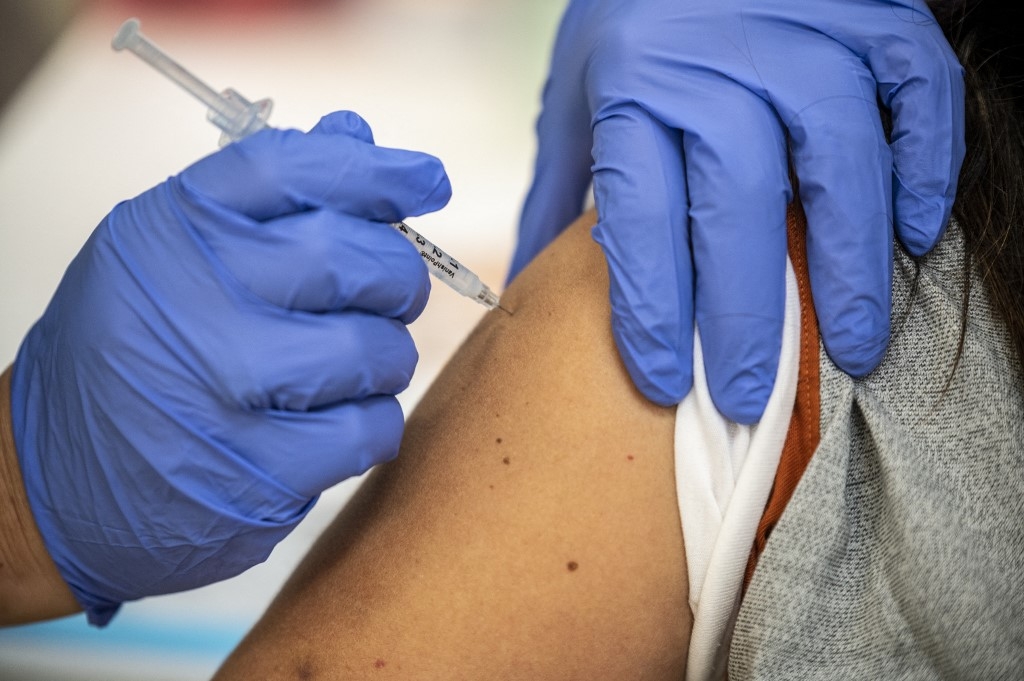Global tourism-heavy economies search for solutions
 |
| SAN ANTONIO, TX - MARCH 29: A patient receives their vaccine at a vaccination site at a senior center on March 29, 2021 in San Antonio, Texas. Texas has opened up all vaccination eligibility to all adults starting today. Texas has had a slower roll out than some states and with the increase in eligibility leaders are hoping more and more citizens get vaccinated. (Sergio Flores/Getty Images/AFP) |
The Spanish government has been working hard to find ways to open up international travel as soon as possible, with Spanish Ambassador to Vietnam María del Pilar Méndez Jiménez saying many Spaniards are homesick after a year away.
Data provided by Ambassador Jiménez shows that tourists to Spain amounted to about 84 million a year before the pandemic, around twice the population of the country. She believed that vaccine visa can help Spain recover its economy and re-establish a safe tourism industry.
More and more governments are supporting the idea of vaccine visas, allowing vaccinated people to not have to be tested or undergo quarantine. Therefore, it is not surprising that the strongest supporters for vaccine visa are countries whose economies are heavily dependent on tourism, including Spain and Greece.
In Vietnam, the government is preparing initial steps for the application of vaccine visas so as to create conditions for those who have been vaccinated abroad to enter the country. The Vietnamese government has also assigned the Ministry of Health and other ministries to prepare the infrastructure to apply vaccine visas, including a software system and a database to confirm information of vaccinated persons.
Such visas could relieve difficulties for economic development, especially the tourism industry. But up to this point, Vietnam has not made any changes in measures to prevent and control the pandemic. Among the recent batches of people entering Vietnam, at least one already had a vaccine visa. However, such visitors still have to comply with the 14-day isolation policy and two tests according to current regulations.
Open doors for international trade are the desire of businesses and people, but experts said that vaccine visas can only be effective if the pandemic is controlled at a near global level and that Vietnam’s testing system must be in sync with other countries.
Economist Nguyen Tri Hieu noticed, “the probability for further outbreaks caused by foreign visitors is low because vaccinated people have the ability to slow the path of the virus in their body.”
Hieu believed that Vietnam allowing foreigners to enter the country will be advantageous in many aspects. Firstly, the country still relies on foreign direct investment. Secondly, the tourism industry remains heavily affected if foreigners cannot enter Vietnam. Thirdly, vaccine visas will also be good for aviation.
However, issuance also means that large funding is crucial. Hieu called this “the price to pay” for the long-term benefits to the Vietnamese economy.
Hieu further believed that it is “not too unbearable for the economy, although COVID-19 has made the budget revenue in 2020 plummet”, reaching only 96.35 per cent of the plan, according to the State Treasury of Vietnam data.
Moreover, Hieu suggested that Vietnam can charge a fee for vaccine visa, as well as for Vietnamese travelling or investing abroad, with a fee of “$50 per visa being reasonable”.
The government may also charge foreigners coming to Vietnam, including those who want to come for investment and tourism.
Currently, Vietnam is working with other countries on the acceptance of vaccine visas through various means. However, the global acceptance of the Vietnamese vaccine visa, Hieu said, “will not be easy.”
According to him, Vietnam’s healthcare system is not considered advanced and developed enough yet, while the value of vaccine visas depends on the development of the healthcare sector. Therefore, the effectiveness of the initiative still depends on the international relations of Vietnam.
“The European Parliament is considering before making a final decision,” Giorgio Aliberti, EU Ambassador to Vietnam, told VIR on March 23 when talking about potential “green passports”.
The ambassador did not comment further on the global acceptance of the Vietnamese vaccine visa, but said that the EU has been using a multilateral mechanism to handle global problems when considering the COVID-19 vaccine as an effective response to the pandemic as well as future strains of SARS-CoV-2.
Aliberti stated that the EU’s position is “to prioritise the safety of the vaccine for humans”.
What the stars mean:
★ Poor ★ ★ Promising ★★★ Good ★★★★ Very good ★★★★★ Exceptional
 Tag:
Tag:
Themes: Healthcare Platform
- PM outlines new tasks for healthcare sector
- Opella and Long Chau join forces to enhance digestive and bone health
- Hanoi intensifies airport monitoring amid Nipah disease risks
- Cosmetics rules set for overhaul under draft decree
- Policy obstacles being addressed in drug licensing and renewal
Related Contents
Latest News
More News
- VNPAY and NAPAS deepen cooperation on digital payments (February 11, 2026 | 18:21)
- Vietnam financial markets on the rise amid tailwinds (February 11, 2026 | 11:41)
- New tax incentives to benefit startups and SMEs (February 09, 2026 | 17:27)
- VIFC launches aviation finance hub to tap regional market growth (February 06, 2026 | 13:27)
- Vietnam records solid FDI performance in January (February 05, 2026 | 17:11)
- Manufacturing growth remains solid in early 2026 (February 02, 2026 | 15:28)
- EU and Vietnam elevate relations to a comprehensive strategic partnership (January 29, 2026 | 15:22)
- Vietnam to lead trade growth in ASEAN (January 29, 2026 | 15:08)
- Japanese business outlook in Vietnam turns more optimistic (January 28, 2026 | 09:54)
- Foreign leaders extend congratulations to Party General Secretary To Lam (January 25, 2026 | 10:01)






















 Mobile Version
Mobile Version